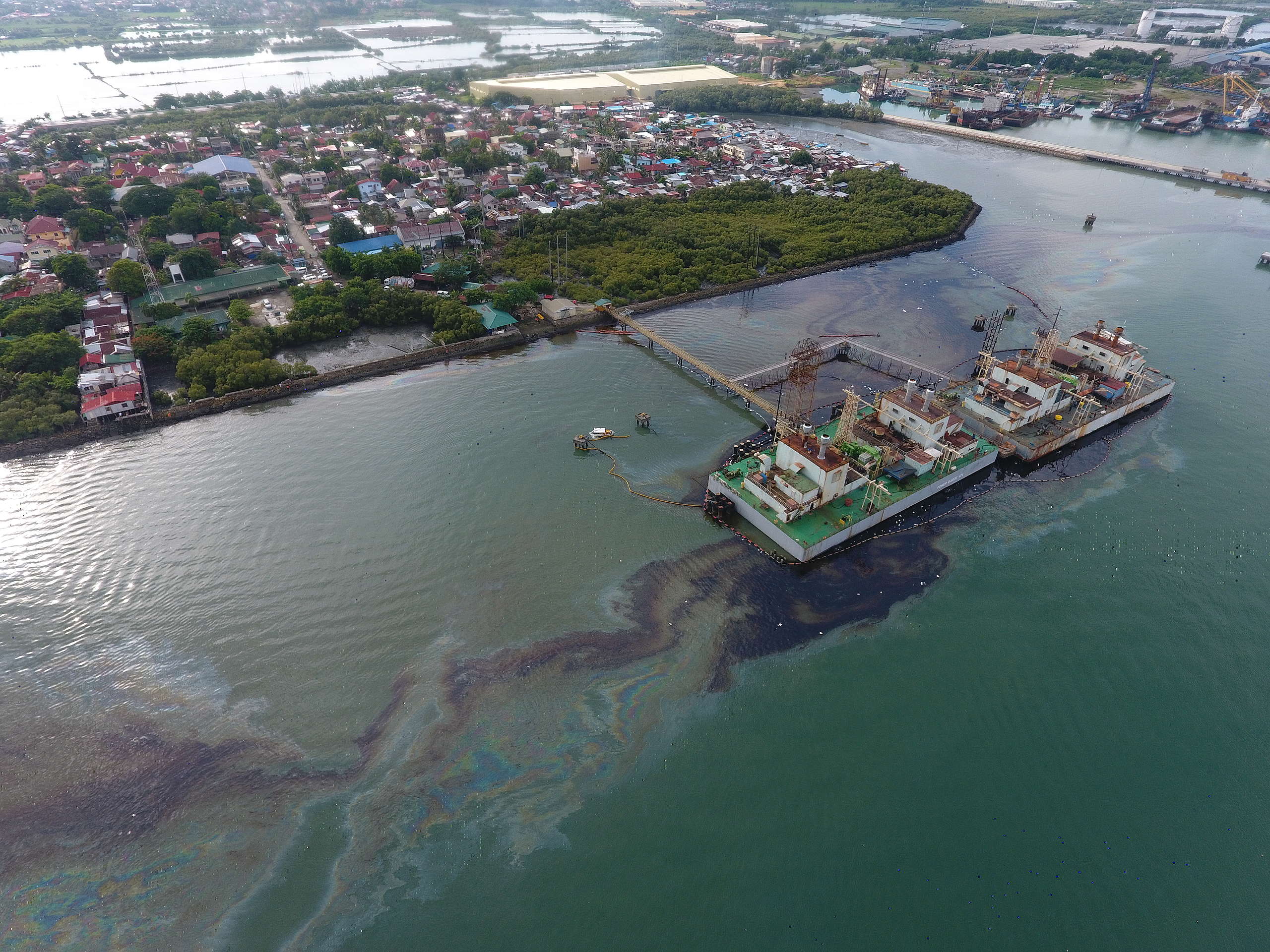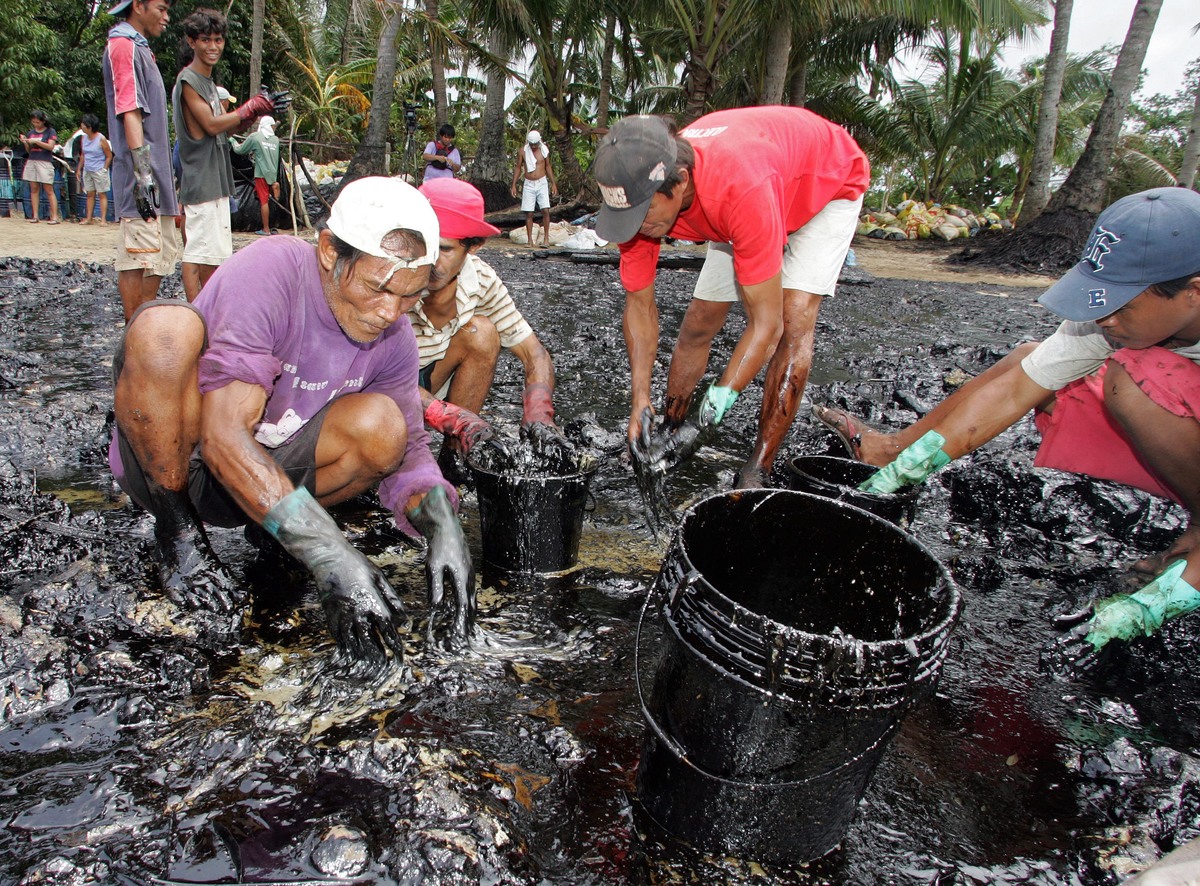QUEZON CITY, Philippines— Communities impacted by the oil spill in Oriental Mindoro and nearby areas, supported by civil society organizations and marine experts, called for transparency from the national government on the true extent of the damage caused by the Oriental Mindoro oil spill during an online forum on Thursday.
The groups also demanded that the administration show its concrete plans to protect the affected communities and ecosystems, and to ensure that the companies responsible for the disaster are held accountable.
“Based on updates from the Philippine Coast Guard, Department of Environment and Natural Resources, and National Mapping and Resource Information Authority, nine out of fifteen municipalities in Oriental Mindoro are currently affected by the oil spill,” said Ram Joseph Temeña of the Provincial Disaster Risk Reduction Management Office (PDRRMO) in Oriental Mindoro. He also added that there are currently 111 barangays with fisherfolk whose livelihoods are affected, and 19,556 affected families from Nauhan to Bulalacao, Oriental Mindoro. There have also been reports of people getting sick from inhalation of toxic fumes.
Coastal communities are very concerned about the oil spill reaching their area, and its immediate and long-term impacts on their livelihoods, health, and biodiversity. “We’re worried na mag-shift ang hangin at mapunta dito sa amin ang oil spill. It’s tuna season here in our area and tons of fish are being caught through sustainable fishing. We have the biggest number of mangroves and well-managed coastal resources here in Northern Antique,” said Mayor Mary Jean Te of Libertad, Antique.
During the forum, local and international experts presented data and projections gathered using available tools and mechanisms, as well as experiences from past oil spills here and abroad. The historical data and past experiences showed that such incidents cause long-term damage to the communities and the environment, leading to significant losses and staggering costs of recovery.
“We’ve learned that the damages from oil spills are long-lasting,” said Paul Horsman, Greenpeace Strategy Advisor. “30 years after the ExxonValdez oil spill in 1989, for example, traces of the oil can still be found in the sediment in those (affected) areas. It’s not that there are obvious black tides coming in; it’s more (of) what you don’t see when all the cameras have gone and the environment is trying to recover—that’s when the longer-term effects begin to be felt by the environment and communities who have to live with them.”
The environmental groups, Greenpeace, Center for Energy, Ecology, and Development (CEED) and Oceana, also raised the alarm about the oil spill’s unfolding devastating impacts on the Philippine’s network of marine protected areas.
“From an interconnectivity approach, where ecosystems depend on each other, the impacts that are being felt in Oriental Mindoro can greatly affect the ecosystems across Verde Island Passage (VIP). If these areas across VIP were to be damaged by the extensive impacts of the oil spills, fisheries in other areas will feel the impacts as well,” said Ivan Andres, CEED Oceans, Coastal Communities, and Climate Program Lead.
Moreover, the groups asserted that such a disaster is likely to happen again if the country continues to rely on fossil fuel energy, and stressed the need for transparency in overseeing offshore safety procedures and compliance by fossil fuel service providers including oil tankers.
“There are accountability measures in place already in our laws…and in these laws, there is a ‘polluter pays’ principle. Under this [is] RA 9483, [which] spells out the liability for those responsible for the oil spill,” said Atty. Liza Osorio, Oceana Legal and Policy Director, urging the current administration to enforce more stringent measures on fossil fuel service providers. Osorio added that this covers cleanup operations at sea, preventive measures, consequential laws or loss of earnings, pure economic loss, and even damage to human health or loss of life, among others. “I believe that the government already has the necessary tools, but what is more important is [that these] accountability mechanisms should be enforced.”
“[Governments and corporations] are trying to take control of the situation; they’re concerned that people are asking them questions, and they really don’t want to, many times, answer those concerns of the public… so they tend to undermine the impacts that might happen, and they tend to overestimate the efforts that they can put in to try to remove the oil,” said Paul Horsman of Greenpeace International.
“This incident is one of many that the fossil fuel industry has seemingly moved on from, while continuing to pass the burden onto affected communities. The least our government and whoever is responsible for the spill can do is to be completely transparent about the actual impacts, how much worse it can get, and what they are doing to mitigate this disaster,” said Greenpeace campaigner Jeff Chua. “More importantly, there must be accountability from the companies involved, especially the owner of the cargo. They must pay for the immediate and long-term damages their business operations have caused, especially in the disruption of livelihoods and access to ecosystem services.”
For press materials (photos and videos from the ground, Zoom recording of the forum and other relevant items) please access this Drive folder.
Please credit our photos and videos to:
Photos by Noel Guevara/Greenpeace – all from Pola, Oriental Mindoro
For Clipreel Footage: Add “Video courtesy of Greenpeace” when using footage.
For videos from Oceana Community Interviews: Please credit Oceana for the footage.
Media Contact
Maverick Russel Flores, Communications Campaigner
Greenpeace Philippines | [email protected] | +63 9176211552
Johanna Carissa Fernandez, Communications and Digital Manager
Greenpeace Philippines | [email protected] | +63 9209759844
-

Greenpeace on Tablas oil spill threat: Fossil fuel industry a ticking time-bomb
Oil tanker MT Princess Empress sank in the Tablas Strait near Oriental Mindoro, with 800,000L of industrial fuel oil threatening to spill.
-

Greenpeace statement on Iloilo power barge oil spill
Quezon City – Around 48,000 liters of oil spilled into waters off Iloilo on 3 July 2020, after an explosion at a power barge owned by AC Energy. Authorities estimate…
-

Greenpeace statement on the Guimaras oil spill incident
The Philippine government must hold Petron and its partners accountable for damages to marine and coastal ecosystems and for their rehabilitation. The scale of this oil spill may turn to be even larger than the Semirara oil spill last year and threatens at least three marine reserves in Visayas.
